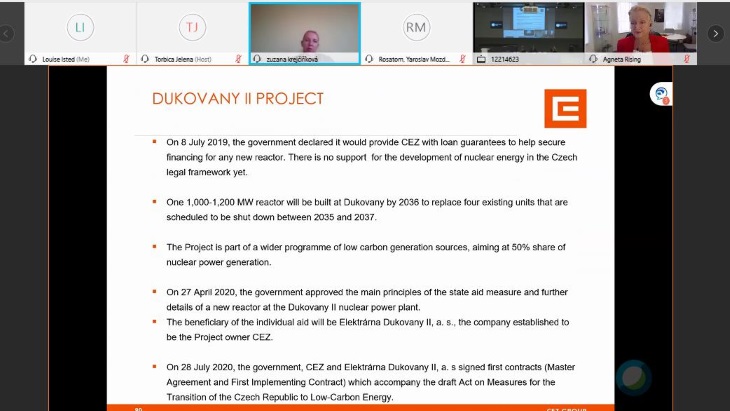In July last year, the government announced it would provide ČEZ with loan guarantees to help secure financing for any new reactor, though legislation has yet to be put in place for the further development of nuclear energy. One 1000-1200 MW reactor at Dukovany is planned for commissioning by 2036 potentially to replace or to be added to the four existing units that are scheduled to be shut down between 2035 and 2037. Their further operation until 2045-2047 is, however, under consideration by ČEZ.
This project is part of a wider programme of low-carbon generation sources aimed at a 50% share of nuclear power generation.
In April this year, the government approved the main principles of a state aid measure and further details of a new reactor at Dukovany, with the beneficiary of this being Elektrárna Dukovany II (EDU II), the company established to be the project owner. On 28 July, the government, ČEZ and EDU II signed the first contracts, the master agreement and first implementing contract which accompanied a draft act on measures for the transition of the Czech Republic to low-carbon energy.
“I think that since the Czech Republic started operating nuclear power plants, there was and still is big public support for nuclear, and there are two main reasons for this: We have operated the plants safely and we inform the public in a timely and open manner about what’s happening with the plants.” Krejčiříková said. “Since we published our plans on new nuclear build, public acceptance has increased from 60% to 63%. The reason I think is that we are the biggest employer in the two regions where the nuclear power plants are based.”
The Czech Republic will face a deficit in its electricity production from 2025, expanding to large-scale proportions by from 2035, she said, adding that, in the Central European region, periods of electricity shortages in the system are forecast to occur in several countries at the same time.
As an industrial export-oriented country, the share of industry in Czech GDP is about 33%, she noted, which is why the government aims to ensure self-sufficiency in electricity production to cover all the needs of the Czech economy. Czech industry has a long history in the nuclear sector, she said, since about 90% of nuclear power plant equipment has been produced domestically. Furthermore, nuclear energy has been identified as a tool for decarbonisation in a number of government policies. These include the national investment plan for 2020-2050; energy and environmental policies; the national action plan for the development of the nuclear energy sector; and the integrated national energy and climate plan.
“When adopting the EU carbon neutrality commitment, the Czech Republic and Hungary were brought on board after assurances that nuclear energy could be included in the final mix,” Krejčiříková said.
The ČEZ Group has around a 68% share of the Czech market, where the energy mix is still 50% coal, 30% nuclear and the remainder is biofuels, gas and renewables. The government has recently set up a coal commission that will set the end date for using coal in the country.
Krejčiříková said that date “will probably be 2038”. She added: “It will be a big challenge for the Czech Republic and for us as a company to replace coal with low-carbon resources, and that’s why the government said already in 2015 that it will go for renewables combined with nuclear. This means that by 2050 we should have by then, 50% nuclear and 50% renewables. We cannot go for 100% renewables because we don’t have the natural conditions [for this] in the Czech Republic.”
The annual generation of power and the share of the electricity mix by fuel type is: coal, 44 TWh (50%); nuclear, 28 TWh (33%); biofuels and waste, 5.1 TWh (6%); natural gas, 3.7 TWh (4%); hydro, 3 TWh (3%); solar, 2.2 TWh (3%); and wind, 0.6 TWh.
At the same time that coal-fired power plants are being phased out, nuclear power units will be close to the end of their current licensed operating periods. The ČEZ Group’s coal-fired capacity will halve, from 7.8 GW in 2016 to 3.9 GW by 2025, and further still, to 2.5 GW in 2035. Full decommissioning is envisaged by 2050.
Currently there are six commercial reactors operating in the country: four Dukovany units that were commissioned between 1985 and 1987 with a design basis service life of 30 years, and two Temelin units that were commissioned between 2000 and 2002, with the same design basis service life.
ČEZ has received “unlimited licences” to continue operating the Dukovany units and plans to apply for the same for Temelin in 2022 Krejčiříková said. The periodic safety review for the Temelin licence extension application has already been completed, she added.
“The political environment has been mostly favourable in the long run and therefore the nuclear power plant service life has been given according to the natural ageing of the equipment and the costs related to its replacement,” she said.
Asked about public support for an energy mix that combines nuclear energy and renewable energy sources, she said that even nongovernmental organisations that claim to be opposed to nuclear power are on board with the new-build plans.
“Even in the Czech Republic, we have quite a lot of anti-nuclear NGOs,” she said. “But we have full transparency and openly discuss what’s happening at our plants and what out plans are, and that’s why the Czech NGOs fully support new build because they know that there is no other option than to go for nuclear and renewables in the Czech Republic, otherwise we will not achieve out climate goals.”





_13505.jpg)
_87975.jpg)
_67826.jpg)
_87695.jpg)






